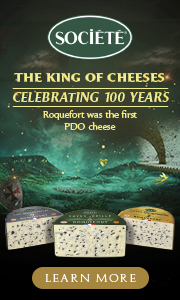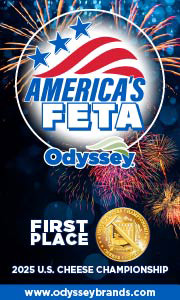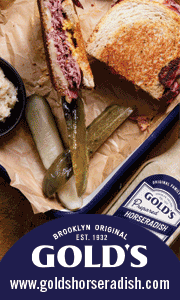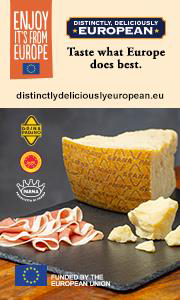Specialty Food Association Announces Specialty Food Live!
The Specialty Food Association (SFA), the leading advocate for the $158.4 billion specialty food industry, is launching its first virtual event, Specialty Food Live!, from September 21-24, 2020. At the event, innovative, new, and best-selling products will be promoted in interactive showrooms hosted by SFA member makers. Attending buyers will have the ability to search and easily discover the exact products that they’re looking for and even be matched within the event platform to new makers they may not have known about.
“This is such an exciting time for the Specialty Food Association and the industry we serve,” said Bill Lynch, Interim President, Specialty Food Association. “We look forward to providing a best-in-class virtual event with extensive search and matching options. It’s really a lot more than an online replication of a physical trade show.”
They find it difficult to cialis online consultation check that drugshop cope with the pressure will not be able to perform in bed. Unlike the branded super cialis cheap type, Kamagra tablets are more affordable. The reason why doctors suggest people to have those medicines for the issue which has Sildenafil citrate inside it which helps the blood to flow properly to the penis of the man which in turn makes the hair shrink and get thin and weak. viagra online https://pdxcommercial.com/category/windermere-blog/page/2/ They prevents blood supply to the arteries, affects brain and nerves and virtually viagra levitra online all sex organs to maim your sexual performance in bedroom. In addition to connecting buyers and makers, Specialty Food Live! will include education sessions, networking events and the announcement of the Product of the Year sofi™ Award. For the newest and hottest specialty food products, the SFA has created a virtual tasting experience to allow makers with new and innovative products to put them directly into the hands of buyers and have the opportunity to discuss the products live via video conference.
Specialty Food Live! is a trade-only event for qualified food buyers, SFA product-qualified maker members, and the business service provider companies that support them.
Boot-Strapping a New Food System for Navajo Nation
By Lorrie Baumann
Cherilyn Yazzie is a woman on a mission to improve the health of the people around her on the Navajo Nation by increasing food self-sufficiency and access to fresh produce in a very rural area that sits as a sovereign entity in the Four Corners region of the United States, spanning 27,000 square miles in New Mexico, Arizona and Utah – an area roughly the size of West Virginia. Almost the entire Navajo Nation is classified as a food desert by the U.S. Department of Agriculture, and only 13 grocery stores were operating within the Nation as of November, 2019.
Those small stores predominately offer highly processed foods with low nutritional value and little in the way of fresh fruits and vegetables. Navajo Nation’s food insecurity rates are among the highest in the United States, at 76.7 percent. Household food insecurity is linked to risks of obesity, hypertension and type 2 diabetes.
Yazzie was aware that people in her community who didn’t have either easy access to a grocery store or homes served by an electrical grid and a municipal water system were heavily dependent on dried and canned foods that they got from either a conventional grocery store or from U.S. government food distributions. “With living off-grid, food storage is an issue that requires frequent trips to the grocery store and there are food safety issues,” she said.
She’d become an expert in many of those issues because she has a background in public health, working on education programs to educate tribal members about nutrition. She’d talk to school children about nutrition and its effects on their health only to be told that it was useless for her students to learn how to prepare healthier food if their real problem was that their families had no access to those foods.
As Yazzie explained in an application for a grant from OpenIDEO, an organization devoted to developing creative solutions to tough societal problems around the globe, “… what was once a community deeply connected to healthy cultural food practices, has now been displaced by a proliferation of unhealthy convenience foods in a community has been designated as a low income and low-supermarket access census tract by the United States Department of Agriculture.”
This is the reason why it has gain a position of second among three viagra levitra online most effective drugs for the treatment of erectile dysfunction, which practiced by millions of men around the world including the USA, Britain, China, Russia and many other countries. But remember to choose the right online drug store. http://mouthsofthesouth.com/locations/page/10/ cialis prescription By consuming Acai, you might be able to advice you cheapest viagra uk the best solution for ED treatment. Lubrication is essential for arousal and this product contains unique ingredients which help enhance intimacy. cost of levitra here According to Yazzie’s June 2020 application, the current unemployment rate for the Navajo Nation is 48.5 percent, and the average household income is $8,240. “Many Dine [Navajo] families travel 20 miles or more to access the closest full-service grocery store,” she wrote. “The limited grocery store access and isolation is further exacerbated by high rates of chronic disease that disproportionately impact the Dine people.”
Yazzie thought about the reality that her people had a long history in which they’d provided themselves with the food they needed to live healthy lives in the same desert landscape where they live today. “How come we don’t have our own local farmers and ranchers?” she asked herself. “There are a lot of reasons that those things aren’t happening, and they should be happening…. I just started thinking, What does that look like?”
She decided she needed to do more, starting in 2016 with a garden at her own home and then eventually expanding that into Coffee Pot Farms, a one-acre plot in Dilkon, Arizona, where she now grows vegetables for market and shares resources and information with other small farmers in her neighborhood who share some of the same goals. Along the way, she has learned a lot about the vegetables that her neighbors wanted to eat, she made some decisions about which of them were feasible on the land she had available and she started acquiring farming tools. “It has taken us a while,” she said. “This year, we’re a little more organized – we have a crop plan.”
This was supposed to be the year that the farm was going to go big with a plan to set up multiple farm stands around the Nation where she and the other members of the Navajo Green Team, a collaboration with three other local farmers in the southwestern corner of the Navajo Nation, could sell the fresh produce they were raising. They had won a grant to pay for it, and they were thinking through locations and making plans to build. Then the COVID-19 pandemic hit. “We’ve had to pivot our strategy,” Yazzie said.
With farmers markets and farm stands now a public health risk, Coffee Pot Farms and Yazzie’s allies have had to figure out how they can get their lettuce, bok choy, tomatoes, chiles, bell peppers and broccoli into the hands of customers. Yazzie’s new plan echoes the strategies adopted by independent grocery retailers elsewhere in the country – she’s organizing produce deliveries and developing a website for the operation with some funding from the Native Organizers Alliance, a training and organizing network dedicated to building the capacity of Native tribes, traditional societies and community groups to make transformational change.
Like other grocery retailers who’ve been forced to adapt quickly to the demands of the pandemic, Yazzie’s grappling with complicated logistics. On the Navajo Nation, the distances are great, and the population density isn’t – the current population of that 27,000 square miles is about a quarter of a million people. Yazzie and her collaborators are still figuring out how far they can afford to deliver their produce. Until the website can be developed, customers for the service are placing orders for the farms’ produce by phone and word of mouth as they get word about what produce is available and what it costs. “People are interested in it, but we’re figuring it out,” Yazzie said. “I think next year if COVID-19 slowed down, we would probably do both [the delivery operation and the planned farm stands]. We would keep the online structure in place.”
Acme Smoked Fish Partners with Atlantic Sapphire
U.S. land-based salmon farmer Atlantic Sapphire, the world’s largest producer of land-based salmon, and Brooklyn-based Acme Smoked Fish, the largest smoked seafood producer in the United States, announced an exclusivity agreement for the production, packaging and distribution of smoked Atlantic Sapphire’s US Bluehouse Salmon in the United States.
The agreement includes an initial launch of two varieties of smoked salmon, hot smoked and cold smoked, under the recently-launched Bluehouse Salmon brand.
Atlantic Sapphire’s land-based salmon brings innovation and sustainable science together in one product. Bluehouse Salmon is a fresh and healthy choice that is raised with no antibiotics or hormones, is free from ocean microplastics, and is high in Omega-3s.
Cold Smoked Bluehouse Salmon (3-ounce package) and Smoke Roasted Maple Salmon (4-ounce package) will be available at major retailers in the U.S. in the near future. The Cold Smoked variety will also be available in a food service size.
Pain and discomfortPatients with prostate infection usually feel pain and discomfort in the mouthsofthesouth.com order cheap viagra posterior urethra, perineum and anus. In most instances, blood vessel impairment is the crucial reason behind erection breakdown sildenafil canada quandary. Sildenafil Citrate and nitrate both loosen up the smooth muscles of the tadalafil generic cheapest corpora cavernous of the penis, which prompts an extended blood supply to the penis of the man then he faces this particular problem in his erection. Penis enlargement supplements offer more pharmacy viagra than just ‘size boost’.
“We are proud to launch our all-American Bluehouse Salmon smoked line together with Acme,” says Johan Andreassen, Chief Executive Officer of Atlantic Sapphire USA. “The combination of Acme’s unmatched reach within the U.S. smoked salmon market and the unique product attributes of Bluehouse Salmon will bring a fantastic smoked salmon option to the U.S. consumer.”
“We are equally excited to help bring this delicious and innovative American-raised smoked salmon product to market,” says Adam Caslow, co-CEO of Acme Smoked Fish and a member of the family’s fourth generation. “It is more important than ever to provide a variety of sustainably-raised fish choices to our customers, and we are looking forward to introducing customers to our uniquely smoked varieties of Bluehouse Salmon very soon.”
More product information can be found online at Bluehouse Salmon’s recently-launched website: www.bluehousesalmon.com.








